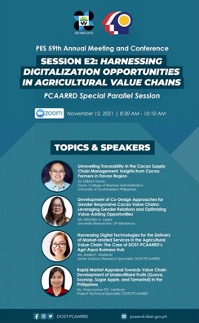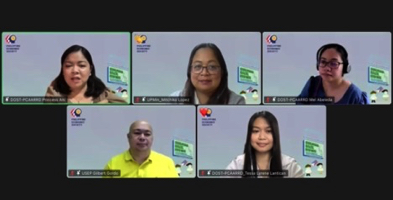 The Philippine Council for Agriculture, Aquatic and Natural Resources Research and Development of the Department of Science and Technology (DOST-PCAARRD) participated and hosted a special parallel session at the 59th Annual Meeting and Conference of the Philippine Economic Society (PES) on November 11-12, 2021.
The Philippine Council for Agriculture, Aquatic and Natural Resources Research and Development of the Department of Science and Technology (DOST-PCAARRD) participated and hosted a special parallel session at the 59th Annual Meeting and Conference of the Philippine Economic Society (PES) on November 11-12, 2021.
With the theme “Building Back Better: Harnessing Digitalization Towards a Transformed Philippines,” the event aimed to present ideas to pave the way for social, economic, and financial inclusion under a new fiscal and monetary consensus highlighting the issues on the existent digital divide across income groups.
In line with the conference theme, DOST-PCAARRD, through the Socio-Economics Research Division (SERD), facilitated a special parallel session titled, “Harnessing Digitalization Opportunities in Agricultural Value Chains.” In the said session, the results of four DOST-PCAARRD supported projects were presented.
Dr. Gilbert M. Gordo of the University of Southeastern Philippines presented the study, “Unravelling Traceability in the Cacao Supply Chain Management: Insights from Cacao Farmers in Davao Region.” He highlighted the lack of record keeping practices among cacao farmers, and the need for a follow-up project to identify the reasons behind this behavior. The results will serve as an input for the pilot traceability system to be developed in Davao City and Davao de Oro to provide transparency, accountability, efficiency, and consumer education in the Cacao supply chain.
Also on cacao, Ms. Mitchiko Lopez of the University of the Philippines Los Baños (UPLB), shared that cacao farming involves both men and women in its operations, thus, understanding their roles and responsibilities is critical in making the cacao value chain more integrated and inclusive. This is part of the study, “Development of Co-Design Approaches for Gender Responsive Cacao Value Chains: Leveraging gender relations and optimizing value-adding opportunities,” which is a project under the John Dillon Fellowship - Philippines Program, also supported by the Council.
 The presentation established the importance of building partnerships and formulation of gender responsive development process documentation in creating a co-design approach for gender responsive cacao marketing innovations. Lopez also said that locating the gender opportunities and addressing the constraints along the cacao VC in the context of digitalization are enormous challenges that can be resolved by a co-design gender approach and interventions.
The presentation established the importance of building partnerships and formulation of gender responsive development process documentation in creating a co-design approach for gender responsive cacao marketing innovations. Lopez also said that locating the gender opportunities and addressing the constraints along the cacao VC in the context of digitalization are enormous challenges that can be resolved by a co-design gender approach and interventions.
The third presentation, “Harnessing Digital Technologies for the Delivery of Market-related Services in the Agricultural Value Chain: The Case of DOST-PCAARRD’s Agri-Aqua Business Hub,” tackled the role and potential of digitalization in the delivery of market-related services in the agricultural value chain and discussed the on-going initiatives of the DOST-PCAARRD’s Agri-Aqua Business Hub (AABH). Ms. Meliza Abeleda, Senior Science Research Specialist of DOST-PCAARRD, stressed the importance of making market information and other market-related services accessible by employing digital technologies, such as the Internet of Things (IoT), is critical for producers, processors, traders, and other players in the agricultural value chain to make a more informed decision.
Abeleda explained some of the constraints in transitioning to digital agriculture and that government support is needed to develop smart value chains. She also shared about intervention strategies implemented by the AABH to make agriculture market information be considered as a public good through digitalization. Abeleda likewise highlighted that the benefits of digitalization can be maximized by farmers at the grassroots level if this can be integrated into the farming systems.
The last presentation was provided by Ms. Tessa Lyrene DC. Lantican of DOST-PCAARRD on the study, “Rapid Market Appraisal Towards Value Chain Development of Underutilized Fruits (Guava, Soursop, Sugar Apple and Tamarind) in the Philippines.” Lantican’s presentation highlighted the industry issues, supply chain analysis, market status, and market potential of the four underutilized fruits. Noteworthy results of the study were: 1) supply chain for underutilized fruits were seen to be efficient, 2) there is high potential for export of the selected underutilized fruits, and 3) huge potential for international collaboration (within SEA countries) for R&D programs for underutilized fruits. Lastly, smart approaches or solutions to address the identified industry problems were presented.
The special parallel session was moderated Ms. Princess Alma B. Ani of SERD while Ms. Rebeka A Paller served as a rapporteur. This event served as a perfect venue for exchanging insights on the digitalization opportunities and barriers to digital inclusivity in agricultural value chains. DOST-PCAARRD remains in the advantageous position to generate impacts in the age of digital transformation and shall continue to leverage on this through the implementation and promotion of digital agriculture.
The strategic partnership of DOST-PCAARRD with PES supports the priorities of the Council on socio-economics and policy research agenda under the Harmonized National Research and Development Agenda (HNRDA) for the AANR sector. The Council provides augmentation funds to qualified professional/scientific and academic organizations that pursue activities supporting the Council’s advocacies, banner programs, and goals.
